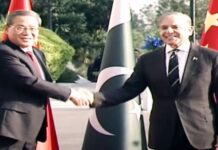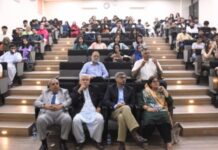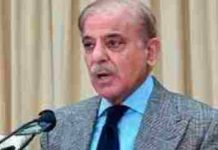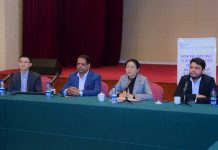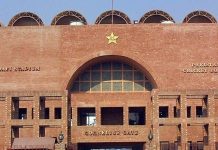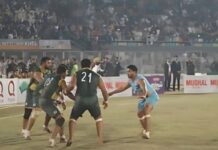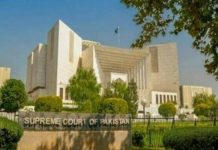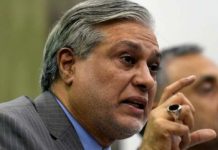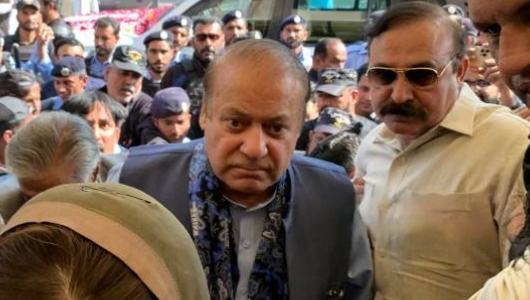ISLAMABAD , Oct 25 (NNI): The interim Punjab cabinet made a notable decision on Tuesday by suspending the sentence of Pakistan Muslim League-Nawaz (PML-N) leader Mian Nawaz Sharif in the Al-Azizia reference case.
This development occurred on a day when Nawaz Sharif was supposed to attend multiple hearings at an accountability court and the Islamabad High Court (IHC). It’s worth mentioning that Nawaz Sharif’s sentence had previously been suspended on medical grounds when he traveled to London in 2019, during the PTI government’s tenure.
This decision, reached via an approved summary, has raised concerns among other political parties, especially the Pakistan Tehreek-e-Insaf, which has rejected the decision, asserting that the provincial government lacks the authority to suspend the sentence of a person convicted by the National Accountability Bureau.
The Interim Information Minister, Aamir Mir, confirmed the decision, stating that the cabinet exercised its constitutional powers under Section 401 of the Criminal Procedural Code (CPC) to authorize the suspension of the former prime minister’s sentence. This section empowers the cabinet to pardon offenders, with the final decision remaining with the court. Aamir Mir also mentioned that Nawaz Sharif formally requested the Punjab cabinet to suspend his sentence.
It’s important to note that Nawaz Sharif had been sentenced in both the Avenfield and Al-Azizia Steel Mills references. The sentence was challenged in the high court, which had suspended the accountability court’s verdict. However, when the politician traveled to London for medical treatment and did not return to pursue the case, the appeal proceedings were left pending.
Instead of approaching the Islamabad High Court, Nawaz Sharif turned to the Lahore High Court (LHC) and was granted permission to travel abroad for four weeks, supported by an undertaking from his brother and party president, Shehbaz Sharif, assuring his return once his health improved. During Nawaz’s absence, the IHC dismissed the appeals on the grounds of non-prosecution, declaring him a proclaimed offender. The court clarified that the rejection of the appeals was based on technicalities rather than the merits of the arguments and mentioned that the applicant could file an appeal against the sentence upon his return.
Meanwhile, Interim Punjab Chief Minister Mohsin Naqvi clarified that the sentence in the Al-Azizia reference has not been suspended; rather, the case has been referred to the court. He informed reporters that during the previous Buzdar administration, Nawaz Sharif’s request had been denied without proper hearing, and now the court has been entrusted with the decision to grant or deny bail, with the case forwarded to the court under Section 401.
He also mentioned that the Punjab government anticipates receiving more such applications in the coming days, assuring that such applications will receive prompt attention.
Meanwhile, the Islamabad High Court (IHC) extended Nawaz Sharif’s protective bail until October 26 in both Avenfield and Al-Azizia references.
The IHC division bench, comprising Chief Justice of IHC Justice Aamer Farooq and Justice Miangul Hassan Aurangzeb, conducted the hearing and issued notices to the NAB in Sharif’s petitions seeking restoration of his appeals against his sentence in both cases. The bench extended the protective bail after the National Accountability Bureau (NAB) expressed “no objection” to the plea filed by the former prime minister.
Nawaz Sharif, along with his brother Shahbaz Sharif and other PML-N leaders, appeared before the court to seek restoration of his appeals against his sentence in the Avenfield and Al-Azizia references.
The bench mentioned in its order that since the prosecution sought time to obtain instructions and make appropriate submissions, it was appropriate to extend protection to the petitioner. The bench also asked the petitioner’s counsel to satisfy the court regarding the maintainability of the petition.
During the hearing, PML-N leader’s counsel Azam Nazir Tarar mentioned that the accountability court had suspended Nawaz’s warrants in the Toshakhana case and approved his bail against surety bonds.
The IHC Chief Justice emphasized the need for the petitioner to explain his absences from the court, taking Article 10-A (right to a fair trial) of the Constitution into consideration. He stated that it was necessary to prove that the absence was not deliberate and ill-intentioned. Tarar responded that the Lahore High Court had granted Nawaz permission to leave the country for medical reasons.
Justice Aamer observed that this is not a matter of routine and stated that the court would issue notices to the opposing side. PML-N’s Tarar requested the court to extend Nawaz’s protective bail to prepare for further arguments, and the prosecutor general of NAB expressed no objections.
Justice Aurangzeb questioned the NAB’s stance, and the prosecutor general was instructed to provide a clear position on the matter at the next hearing. The court issued notices to the NAB on Nawaz’s petitions for restoration of the appeals against his conviction and extended his protective bail until the next hearing.
Earlier in the day, Nawaz Sharif appeared before the Accountability Court in Islamabad for attendance in the Toshakhana reference filed by NAB. NNI








